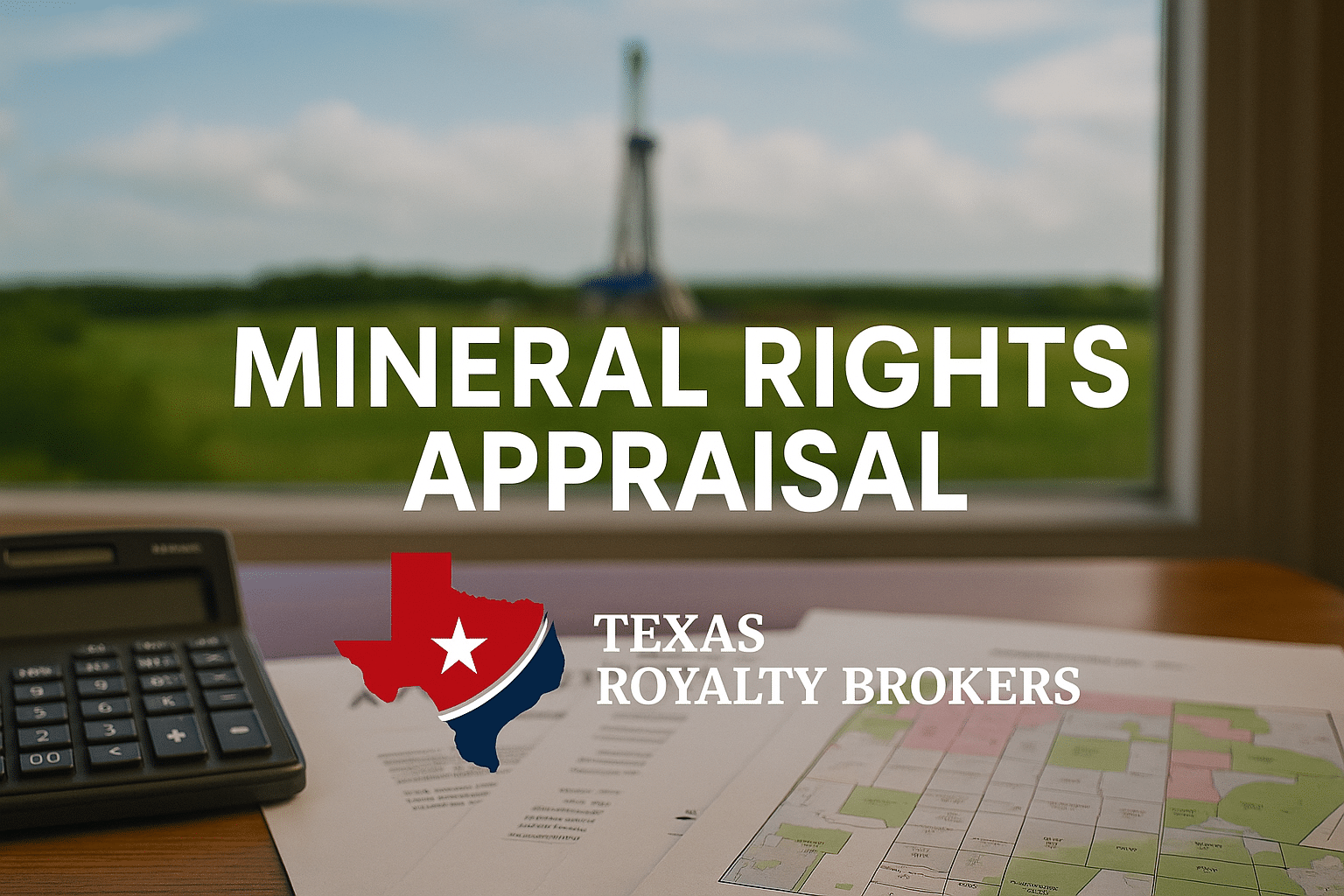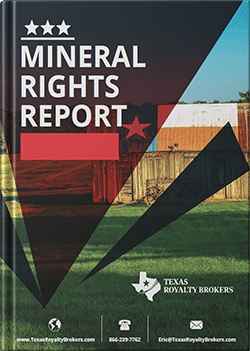Why Texas Royalty Brokers?
sellers
Buyers
State Specific Guides
Resources
Mineral Rights Appraisal
If you’re trying to figure out what your mineral rights are worth, you’re not alone. One of the most common questions we hear from mineral owners is, “Where can I get an appraisal for my mineral rights?”
It’s a fair question and one that makes a lot of sense. Whether you’re thinking about selling, planning your estate, or just curious about what you own, getting a clear value feels like the right place to start.
But here’s the catch: there really isn’t such a thing as a traditional mineral rights appraisal.
That might come as a surprise, especially if you’ve spent time searching online or calling around trying to find someone who offers that service. The truth is, mineral rights don’t follow the same rules as real estate. There’s no licensed appraiser, no standard report, and no set process for putting a number on what you own.
That doesn’t mean you’re out of luck.
In this article, we’ll walk you through what mineral owners are really looking for when they ask for a mineral rights appraisal. We’ll explain how value is actually estimated, why the process can be confusing, and how to get a realistic sense of what your mineral rights are worth.
Our goal is to break it all down in a simple, straightforward way. No fluff, no sales pitch. Just clear information you can use to make the right decisions.
Understanding Mineral Rights Appraisals
When someone says they’re looking for a mineral rights appraisal, what they usually want is a clear, professional estimate of what their minerals are worth. That’s a reasonable thing to ask for. With assets like homes or vehicles, there are licensed appraisers who provide official reports that banks, lawyers, and tax professionals all accept.
But mineral rights are different.
There’s no such thing as a formal, licensed mineral rights appraiser. There’s no standard form or process that produces a single, universally accepted value. That throws a lot of people off because it feels like there should be a simple answer.
So why isn’t there?
Why Mineral Rights Appraisals Don’t Exist
Mineral rights don’t follow a one-size-fits-all formula. Every property is different, and the value depends on a long list of factors that can change from one month to the next. That’s what makes traditional appraisals impractical and why they don’t really exist in this space.
Here are a few reasons why it’s so difficult to assign a fixed value to mineral rights:
-
Location matters a lot. Even within the same county, mineral rights in one section can be worth significantly more than those just a few miles away, based on drilling activity and geological potential.
-
Production history can change everything. If your minerals are producing oil or gas, the amount and consistency of that production directly impact value. Older wells with declining output are worth less than newly drilled, high-performing wells.
-
Future development is unpredictable. Sometimes mineral buyers are willing to pay more if they expect new drilling in the near future. But unless you’re closely following operator activity and permitting data, it’s hard to know what’s coming.
-
Commodity prices are always shifting. Oil and gas prices go up and down constantly. That directly affects how much revenue your minerals could generate and what a buyer is willing to pay.
-
Buyer demand changes. Your minerals are ultimately worth what someone is willing to pay for them. Market demand varies depending on the area, buyer strategy, and available capital.
With all these moving parts, there’s no standard valuation process that works across the board. It’s not like pulling recent home sales or checking the Blue Book value of a truck. Even professionals rely on a combination of data, experience, and real-time buyer interest to estimate value.
So while there’s no official “appraisal” available, there are practical ways to estimate what your mineral rights are worth. We’ll walk through those methods in the next section.
Reasons People Need a Mineral Rights Appraisal
There are plenty of reasons why someone might start searching for a mineral rights appraisal.
For most mineral owners, it’s tied to a major life event or financial decision. The need to understand value becomes important, but because the concept of a mineral rights “appraisal” is so unclear, many people are left unsure of what to actually do next.
Let’s look at the most common reasons people start looking for a mineral rights appraisal, and what they’re really trying to solve.
Curiosity About Value
Sometimes it’s just curiosity. You might have owned mineral rights for years and never paid much attention to them. Then a few royalty checks show up, or oil activity picks up in your area, and you start wondering what your property is actually worth.
This usually starts with a Google search like “how much are my mineral rights worth” or “can I get an appraisal on mineral rights.” That’s when many owners hit a wall. There’s no standard service to give you that answer, and what you find online is often vague or outdated.
Curiosity is a good reason to learn more, and it’s often the first step in deciding whether to hold or sell.
If you want real time data and a clear picture of what’s going on with your mineral rights ownership, contact Texas Royalty Brokers for a free consultation. It’s free and there is no obligation.
Thinking About Selling Mineral Rights
This is one of the biggest reasons people want an appraisal. If you’re considering selling your mineral rights, it makes sense to want a number you can trust.
Most owners don’t want to go into a sale blind. They want a ballpark estimate, or at least a way to tell if an offer is fair. The problem is, there’s no easy way to get that number without putting your minerals in front of real buyers.
If you’ve received offers, they can be helpful reference points, but they’re almost always lower than what the property could sell for in a competitive setting. That’s why many owners turn to Texas Royalty Brokers to help them understand value before making a decision.
Inheriting Mineral Rights
Inheriting mineral rights can be overwhelming, especially if you’re not familiar with oil and gas. Many new mineral owners are simply trying to get organized and figure out what they just inherited. That often leads to questions like:
What are oil and gas mineral rights worth?
Should I keep them or sell them?
How do I report them for taxes?
The value of inherited mineral rights can vary widely, even within the same family. One sibling’s interest might include producing wells, while another’s might be undeveloped. That’s why many heirs look for a valuation to help guide next steps.
Estate Planning and Dividing Assets
If you’re planning your estate and you own mineral rights, knowing the value is important. You may want to divide assets fairly among children or create a trust that includes minerals as part of the estate.
Mineral rights can represent a significant portion of your estate’s total value, especially if there is current production or strong potential for future development. But since value can be hard to pin down, it’s common to look for an appraisal to help make those decisions.
In these cases, it’s less about selling and more about organization, fairness, and good planning.
Pro Tip: If you are trying to divide up mineral rights held in an estate, there are two clean paths:
- Divide the mineral rights equally among the heirs. Each heir will retain their share of the actual mineral rights ownership.
- Sell the mineral rights and then divide the money equally among heirs.
When dividing up an estate, some executors make this situation complicated and unfair by trying to assign a value to the mineral rights and then dividing up the assets. For example, if you assign a $500K value to a home and then assign $500K to the mineral rights and give one heir the home and one heir the mineral rights, someone just got a bad deal.
Step-Up in Basis and Tax Planning
When someone passes away and their heirs inherit mineral rights, the IRS allows for what’s called a step-up in basis. This means the new tax basis is adjusted to the fair market value of the property at the time of death.
To take advantage of this, you’ll need to establish a reasonable value that can be supported if questions ever come up with the IRS. This is where a lot of people think they need a formal appraisal, like you’d get with a house or business, but mineral rights don’t have a standard process for this.
Instead, most accountants and attorneys will accept a market-based estimate. This can include recent offers, royalty income multiples, and professional opinions backed by data. It’s not a stamped appraisal, but it’s often more accurate and more reflective of what the property is actually worth.
Divorce, Partnership Disputes, and Legal Settlements
In legal situations where assets are being divided, such as divorce or a business partnership ending, mineral rights often come into play. If the minerals have income or long-term value, both parties will want to know what they’re worth before making any agreements.
This is another scenario where people often search for an appraisal, hoping to find something official that can be submitted to attorneys or courts. In reality, what’s needed is a reasonable valuation that both sides can accept, often backed by professional insight or market activity.
You’ve Received Offers and Want to Know if They’re Fair
Many mineral owners don’t go looking for an appraisal until an offer shows up in their mailbox. At that point, the questions start. Is this a good offer? Can I get more? Is this the right time to sell?
It’s completely normal to feel unsure. Most of the time, offers are lower than market value. They’re designed to catch your attention and prompt a quick decision, not necessarily reflect what your minerals are really worth.
Did you know that when mineral owners list mineral rights for sale at Texas Royalty Brokers they nearly always have an offer in hand? We are able to bet those offers over 95% of the time. We typically see 10% to 30% higher prices net of commission.
The offers you get in the mail are a starting point, not the market value.
Methods to Appraise Mineral Rights
Even though there’s no formal appraisal process for mineral rights appraisals, there are a few common ways people estimate what their minerals might be worth.
These methods are used by mineral buyers, mineral brokers, and oil and gas investors, but it’s important to understand that none of them are exact. Every property is different, and values can vary widely depending on who’s looking at it.
Let’s break down the main methods used to appraise mineral rights.
Cash Flow Method
If your mineral rights are producing monthly royalty income, the most common starting point is the cash flow method. This approach looks at your average monthly income and multiplies it by a range of 3 to 6 years.
For example, if you’re receiving $1,000 per month, your minerals might be valued somewhere between $36,000 and $72,000 using this method. The exact multiple depends on the location, operator performance, production decline rates, and other risk factors.
To see what the cash flow value of your mineral rights, enter your average royalty income below:

While this is a good starting point, it’s only part of the picture.
Upside Potential
The second part of mineral rights value is something called upside potential. This is where things get less predictable.
Upside potential refers to what could happen in the future. That might include new wells being drilled, enhanced recovery techniques, or nearby development that hasn’t happened yet. These possibilities can add significant value, even if your minerals aren’t producing much today.
This is the part that makes traditional appraisals difficult, if not impossible.
Ask ten different buyers how much upside a property has, and you’ll get ten very different answers.
One buyer might see huge potential, while another sees very little. Yet these opinions can swing the value of your minerals by tens or even hundreds of thousands of dollars.
You might own mineral rights that only generate $20 a month in royalty income, but if a major operator is preparing to drill in that area, those rights could be worth well over a million dollars. That kind of upside is impossible to calculate with a formula, which is a big reason why mineral rights appraisals don’t exist in the traditional sense.
Recent Offers
If you’ve received offers from buyers in the mail or through email, those can be helpful data points. Offers can give you a general idea of what buyers might be willing to pay. But keep in mind, most of these offers are on the low end.
Buyers typically send out offers hoping a mineral owner will accept without shopping around. It’s not that the offers are dishonest, but they often represent the buyer’s ideal purchase price rather than the true market value.
If you’ve received several offers in a similar range, it’s a good starting point. Just know that with competition involved, your minerals will nearly always sell for a significantly higher price.
No Such Thing as Comps in Mineral Rights
In the housing market, it’s common to use comparable sales, or “comps,” to figure out what a property is worth. If two houses are similar in size, layout, and condition, and they’re in the same neighborhood, their value will likely be similar.
Mineral rights are completely different.
Even if two properties are side by side, their mineral rights can be worth drastically different amounts. One might have active production from multiple wells, while the other hasn’t been drilled at all. Lease agreement terms, royalty percentages, well performance, and future development potential can all vary from tract to tract.
There’s no way to truly compare one mineral property to another.
The geology underground is different. The operator interest is different. The timelines for development are different. That’s why comps don’t exist in the mineral rights world and why no one can plug your info into a spreadsheet and give you a reliable appraisal.
What are your mineral rights worth? Get an Experts Opinion
If you want a clear picture of what your mineral rights are worth, we can help. At Texas Royalty Brokers, we specialize in mineral and royalty sales. We use real market data, current buyer activity, and industry insight to give you an accurate estimate of value.
No pressure. Just honest guidance from a team that knows the market. Contact us for a free consultation.
Do You Need a Mineral Rights Appraisal?
For most mineral owners, the answer is no.
While it’s common to search for a mineral rights appraisal, what people really want is to understand what their minerals are worth. In most situations, a formal appraisal isn’t required, and in many cases, it doesn’t even exist in the way people expect.
If you’re thinking about selling, planning your estate, or sorting through an inheritance, you usually just need a solid estimate of fair market value. That can come from market-based data, recent offers, or insight from professionals who understand how mineral rights are valued. There’s no need for a certified appraisal, because no such license or standardized process exists for mineral rights.
There are three situations where you may need a mineral rights appraisal or estimate of value.
Estate Tax Planning and Reporting
If the total value of an estate exceeds the federal estate tax exemption, a mineral rights valuation may be necessary. As of 2025, the federal exemption amount is $13.99 million per individual or $27.98 million for a married couple. If the estate falls below that threshold, no federal estate tax is due, and no formal appraisal is required.
However, if the estate is large enough to trigger estate tax reporting, the value of any mineral rights must be included. In this case, an estimate of fair market value is needed. While there is no licensed mineral rights appraiser, most tax professionals will accept a market-based estimate backed by reasonable documentation. This can include a royalty income multiple, recent offers, or a broker’s opinion. See our section on methods to appraise mineral rights.
Even in estates that are not taxable, many families still want a valuation because they are trying to determine how to divide assets. However, the executor should simply sell and divide the cash or divide the mineral rights equally among the heirs. In our view, these are the only fair options.
Capital Gains and Income Tax Reporting
When you sell inherited mineral rights, the IRS requires you to report any capital gains based on your cost basis. The good news is that mineral rights receive a step-up in basis at the time of inheritance. This means your tax basis is adjusted to the fair market value of the property at the date of death.
If you eventually sell your minerals, you can work backward from the sale price using methods described in our mineral rights tax guide to establish a basis and calculate any gains.
Having an estimate at the time of inheritance helps avoid surprises later when it’s time to file taxes after a sale.
Medicaid Eligibility and Asset Limits
Mineral rights are considered a countable asset when applying for Medicaid. If you or a family member is planning to apply for long-term care coverage, it may be necessary to disclose the value of any mineral rights owned.
Each state has its own rules for Medicaid asset limits, but in general, applicants must stay below a certain threshold to qualify. Even if the minerals are not producing income, they still have value on paper. In some cases, a valuation is needed to determine eligibility or to prepare for a Medicaid look-back period.
A market-based estimate can be used to document value, even if there is no royalty income at the time. Planning ahead with a clear understanding of the asset’s value can make a big difference in how benefits are structured and approved.
Our recommendation? Use 3x your most recent average royalty income OR recent offers to estimate value. A 3x multiple may be conservative, but it’s not unrealistic.
Should I Get a Reserves Report or Engineering Study?
Some mineral owners consider ordering a reserves report or engineering study to estimate the value of their mineral rights. While it may sound like a solid, technical approach, it’s usually not helpful for individual owners.
These reports are expensive. A professional reserves or engineering study can cost thousands of dollars. They are designed for oil companies and large investors who need to evaluate long-term development plans, not for someone trying to understand what their minerals are worth today.
The bigger issue is accuracy. These reports often overestimate value by using long-term production forecasts and optimistic price assumptions. The final number might look impressive on paper, but it rarely matches what a real buyer would actually offer.
At the end of the day, the report may give you a number that feels official, but it doesn’t reflect current market value. It also won’t help you sell your minerals or make better decisions.
If you want to know what your minerals are really worth, focus on market-based estimates and actual buyer interest. That will give you a much clearer picture than any reserves study ever could.
Mineral Rights Appraisal – Frequently Asked Questions
Do I need an appraisal to sell my mineral rights?
No. You do not need a formal appraisal to sell. You just need a strong understanding of market value, which comes from current buyer demand and real-world offers.
Can I get a licensed mineral rights appraiser?
No. There is no license for mineral rights appraisers. This is part of why there’s no such thing as a traditional appraisal for minerals.
What’s the difference between appraised value and market value?
Appraised value is a professional opinion of value. Market value is what a buyer is actually willing to pay. With mineral rights, market value is more important and more accurate.
Can I use royalty income to figure out value?
Yes, but it’s only part of the picture. You can multiply your average monthly royalty by 3 to 6 years for a rough estimate, but this does not include upside potential.
How do I know if an offer is fair?
Compare multiple offers and look at activity in your area. Offers are usually low unless there’s competition involved.
Are mineral rights considered an asset for taxes or Medicaid?
Yes. Mineral rights count as assets and may need to be valued for estate taxes, capital gains, or Medicaid eligibility.
How can I determine my basis for tax purposes?
Read our mineral rights tax guide.
How do I find out what my minerals are worth?
The best way is to talk to a mineral rights broker who understands the market and has access to real buyer activity.
Is there a website where I can look up mineral values?
Not really. Mineral sales are private, and values vary widely. Public websites rarely reflect true market value.
Does the appraisal value listed on my property tax statement indicate value?
Absolutely not. Do NOT use the appraised value from your property tax statement to determine value. This only relates to your income from the prior year and this number is not remotely accurate.
Do I need to get my minerals appraised if I’m just holding them?
No. If you’re not planning to sell or dealing with taxes or estate planning, there’s no reason to get an estimate right now.
Final Thoughts on Mineral Rights Appraisals
If you’ve been searching for a mineral rights appraisal, you’re not alone. It’s one of the most common things mineral owners ask for.
As you’ve seen, there’s no official appraisal process when it comes to mineral rights. Every property is different, and value depends on a mix of income, location, development potential, and what buyers are willing to pay.
Most of the time, you don’t need a formal appraisal. You just need a clear, market-based estimate to help you make smart decisions. Whether you’re planning ahead, sorting out taxes, or thinking about selling, having the right information can make a big difference.
At Texas Royalty Brokers, we help mineral owners get real answers with no pressure. If you’re ready to find out what your mineral rights are worth, reach out any time. We’ll walk you through it, answer your questions, and connect you with serious buyers if and when you’re ready.






